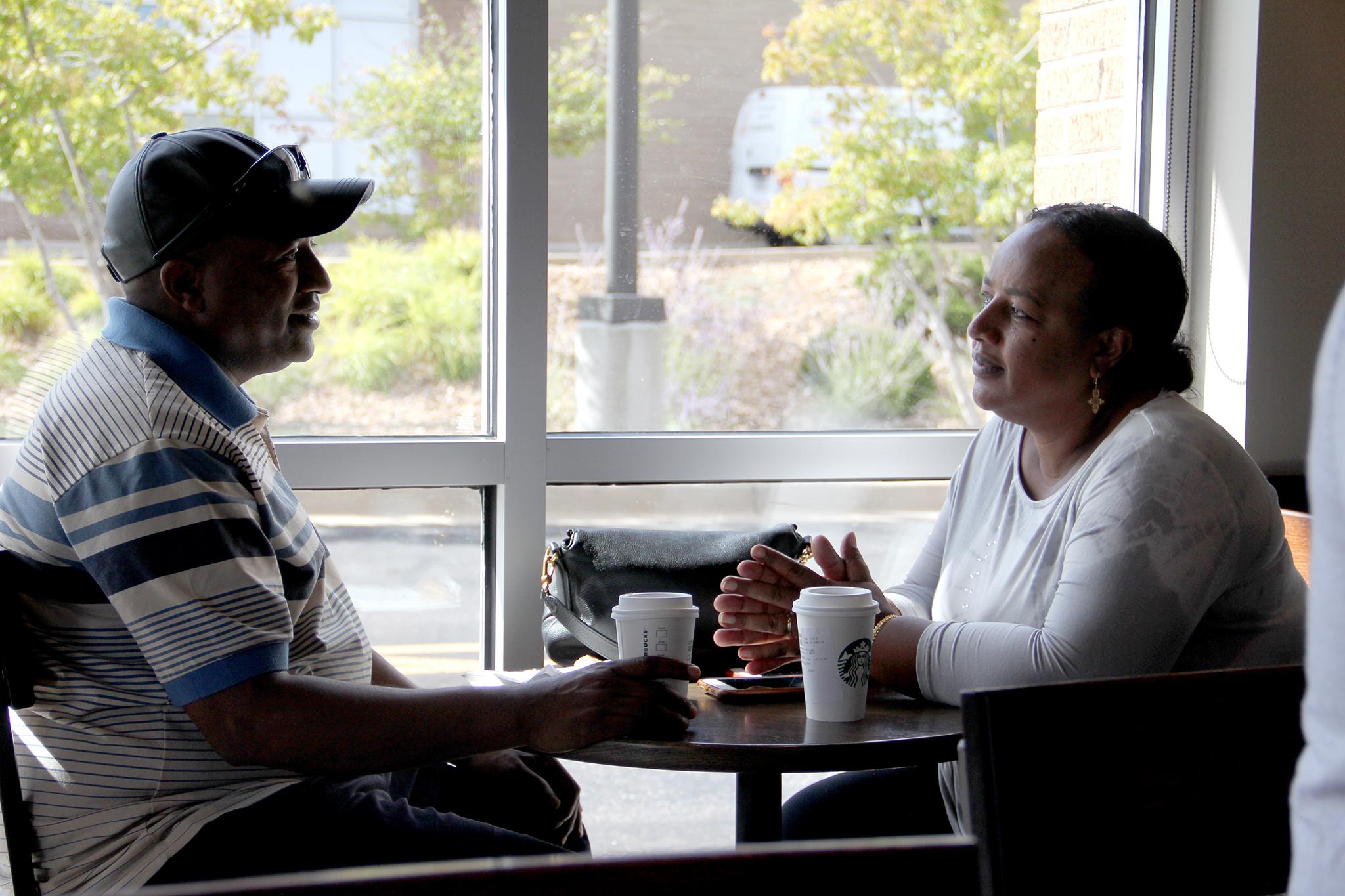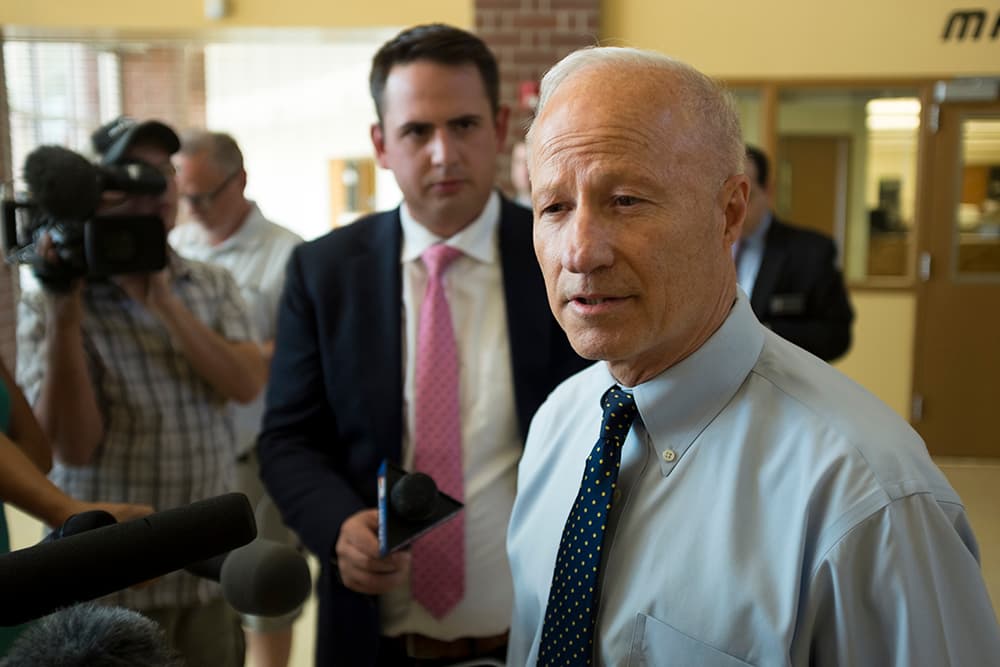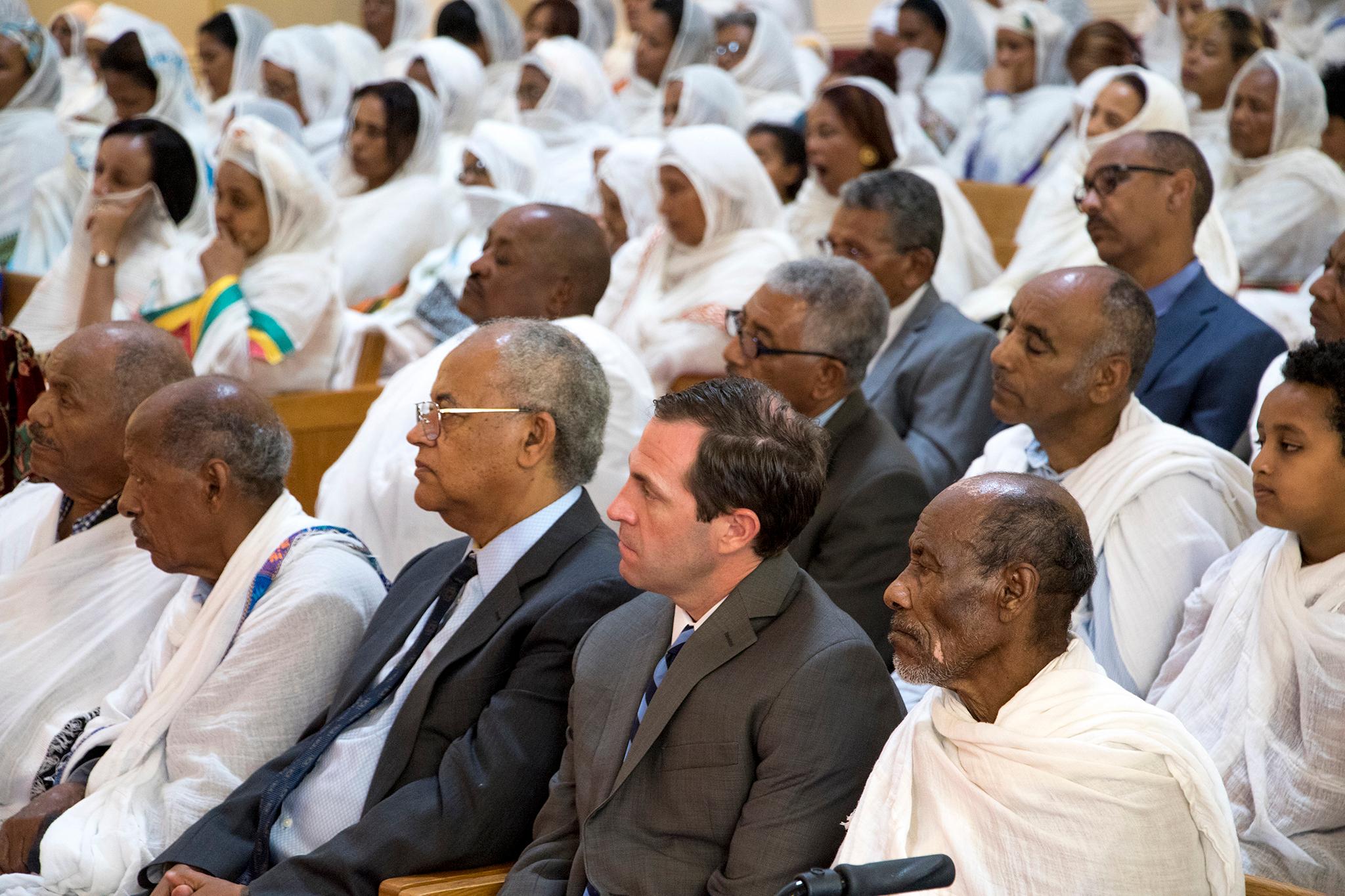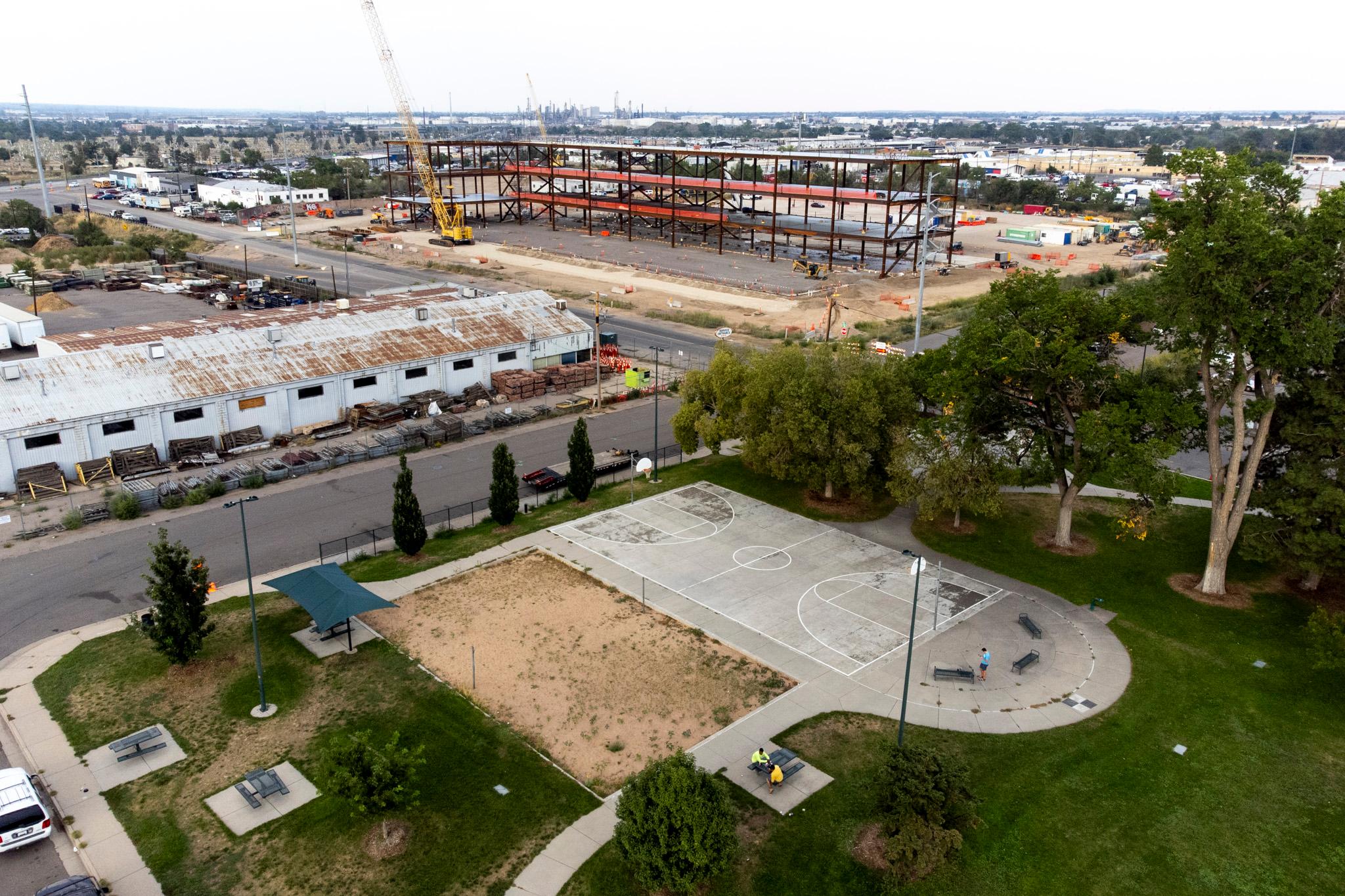Candidates in the 6th Congressional District race are both eagerly trying to court the thousands of Ethiopian-born and Ethiopian-American residents of Aurora, a key voting bloc in the vastly diverse city that is the district's largest.
The most recently available data from the U.S. Census Bureau shows there are more than 3,200 foreign-born Ethiopians in Aurora. The number makes them the second-largest foreign-born population in Aurora after Mexican expats, and at least one estimate has put the total number of Ethiopians and Eritreans, foreign-born or not, at 30,000.
Republican incumbent U.S. Rep. Mike Coffman has a head start. He’s built a reputation as a voice for community members over the last few years. Behind him is Democrat Jason Crow, a newcomer who spent Sunday celebrating Ethiopian New Year at St. Mary Ethiopian Orthodox Church.
Both have already done their fair share of outreach, with Crow's campaign hosting and joining several meetings and events last month with Ethiopian and other groups representing African countries (many which are posted on the Africans in Aurora for Jason Crow page).
"They've heard plenty of promises before on issues like immigration, health care, and education, but under this administration too much is at stake to have leadership that won't deliver," Crow said in the statement. "The risk is even greater when our current congressman votes with Trump 96 percent of the time and tells donors behind closed doors that he's 'to the right of Trump' on important immigration issues."
There is also an Ethiopian Americans for Mike Coffman Facebook page boasting some 20,000 views a week.
"I’ve been honored to represent Colorado’s African immigrant community in Congress and work alongside them to improve life for their families," Coffman said in a statement. "They are an incredibly hardworking people, who strengthen Colorado with their contributions, and I’m honored to have the support of many of their community leaders.”
Beyond political parties or the candidates representing them, community members said there’s a split between Ethiopians in the community that can be traced back to the 1970s.
A very quick Ethiopian history lesson: After then-emperor Haile Selassie was removed from the throne in the early 1970s, a communist regime came to power. In 1991, an armed rebel group took over and established a coalition called Ethiopian People's Revolutionary Democratic Front (EPRDF), according to Aurora community organizer Neb Asfaw.
The term “coalition” is used lightly, as the EPRDF was meant to appear as if it represented people across the country, but it was primarily ruled by people from the Tigray region, Asfaw said. The area is located in the northern part of Ethiopia.
Now, that division is still pretty raw, especially among some people from the southern region and the northern region of Ethiopia. Asfaw is from Ethiopia’s capital, Addis Ababa, and said he doesn’t identify with one regional group.
Crow supporters in the Ethiopian community see problems with many of Coffman's policies.
Senaye Gebremichael, 32, from Aurora, is a registered Democrat and first-generation Ethiopian-American. He described himself as a progressive who’s supporting Crow because of his ideas on education, healthcare and immigration rights. His family is from the Tigray region.

“I am a big critic of Coffman,” Gebremichael, who serves on Aurora’s Immigrant and Refugee Commission Board, said. “He votes with Trump on everything. (He’s) voted against Obamacare. To me, as a registered Democrat, he doesn’t stand for me.”
Gebremichael said the split among community members also stems from what the congressman should focus on.
Gebremichael said Coffman has done his job in connecting with the community — he’s a regular presence at St. Mary Ethiopian Orthodox Church — and that his efforts are reflective of what those community members want. But he takes issue with that because “their issues are not domestic.”
“They care about foreign policy, foreign politics,” Gebremichael said. He would like a candidate that focuses more on what Ethiopians are doing locally, like their contributions to the local economy. He doesn’t believe Coffman can do much in terms of improving foreign policy.
The divide also seems generational, since Gebremichael said older Ethiopians appear more concerned with how their home country continues developing. He also said discussions about a family’s background can quickly get personal.
“They would say, ‘Oh Senaye, you’re the oppressor, you’re oppressing my family,” Gebremichael said. “(I was) born and raised in America. I was born here. This is my home.”
The divisions between the groups go back decades, to disagreements stretching through generations, Gebremichael said.
“We shouldn’t bring that into local government politics,” Gebremichael said. “The most important thing is we need to come together, to figure out what affects us the most.”
Coffman supporters believe the congressman has made genuine attempts to listen to them.
Aurora resident Girum Alemayehu, 52, came to the city in 1993, two years after first arriving in the U.S. from Ethiopia on a student visa. He arrived from Ethiopia's southern region; Alemayehu said most Ethiopians in Aurora now are from the southern Amhara and Oromia regions.
“Many of us immigrated because things are not better for us over there, it’s not for no reason,” Alemayehu said. “The politics were bad and we had bad government (in Ethiopia), for so many years ... so most people see the opportunity, see the light here, freedom. So we invite all people.”

Alemayehu, an unaffiliated voter, said he’s supporting Coffman because the congressman kept his word. But he said he understands why Ethiopians from the Tigray region may not be big fans of Coffman, saying the congressman “exposed the government’s brutality."
Alemayehu said Coffman was honest and told them what he could do, despite being a member of a party known for opposing pro-immigration reform.
“We asked him if he gets elected, do you still keep this relationship?” Alemayehu said. “He said, ‘Mark my word,’ as many politicians before did. As soon as he was elected, he came to our church, just to worship with us. ... He calls us, he’s helped a lot of our people.”
Alemayehu believes there's only a small minority of people within the community who haven’t made up their mind. He thinks most Ethiopians in Aurora are supporting Coffman.
“So, it’s not the party, it’s just the person,” Alemayehu said. “He’s a person we’ve been happy supporting ever since that. He’s been coming to us and helping all our people.”
House Resolution 128 earned Coffman some respect.
Asfaw, who supports Coffman but doesn’t live in the district, said that among Coffman’s biggest achievements — and likely the reason why he’s so popular in the Ethiopian community — is House Resolution 128.
“It was just something that really victorious for Ethiopians, for American people, for Ethiopians all over,” Asfaw said, adding that the event brought Coffman international recognition. “He’s very known for what he’s done.”
The resolution condemned Ethiopia’s regime over alleged human rights abuses. Human Rights Watch previously testified that there were "serious grounds for concerns" in Ethiopia and neighboring Eritrea. (The two countries share a conflicted history, to say the least.) It marked the first time the U.S. House of Representatives condemned the Ethiopian government over its alleged human rights violations, according to Coffman's office.
Another quick lesson, according to Asfaw: For the past 27 years, the ruling EPRDF has run Ethiopia. During this time, Ethiopia was tagged by the U.S. government as a partner in the war against terrorism. That meant they got U.S. money. The money was given in part to contribute to forces fighting terrorism activity in the area, including nearby Somalia.
Asfaw said that because they were allies, the U.S. “looked the other way when human rights violations” were taking place there. Asfaw said people were tortured, laws made it illegal to create political oppositions, and the media was controlled by the state.

Then in 2016, people got fed up and started demonstrating. It led to strikes that the government shutdown by killing protestors, Asfaw said. The Guardian reported in October 2016 that the government had killed some 500 Oromo demonstrators.
Asfaw said community members back home felt U.S. money was funding human rights violations: “The U.S. is supporting a government that is basically killing our brothers and sisters back home.”
That’s where Coffman stepped in, c0-sponsoring legislation that formally put the country's government on watch when it was passed in April, with help from local leaders who Asfaw said were brought to the table to negotiate.
Asfaw said the Ethiopian regime lobbied hard against the bill, which was publicly opposed by Kassa Teklebirhan, Ethiopia’s Ambassador to the United States.
It isn't surprising that the district has unusual alliances -- it's an unusual district.
Metropolitan State University political science professor Robert R. Preuhs told Denverite said it's hard to find another congressional district in the country similar to the 6th Congressional District.
It's a district with a 20 percent foreign-born population, but it's represented by a Republican congressman.
Coffman has done the kind of outreach said more representatives should do for foreign-born communities, Preuhs added. He said that if candidates, no matter the party, "neglect" this voting bloc, it could mean the difference between winning or losing the seat.
“We do now from political science research that both Democrats but also Republicans with a high-percentage of immigrant populations, (they) tend to reach out," Preuhs said. "The reality is that the 6th congressional district is unique."













